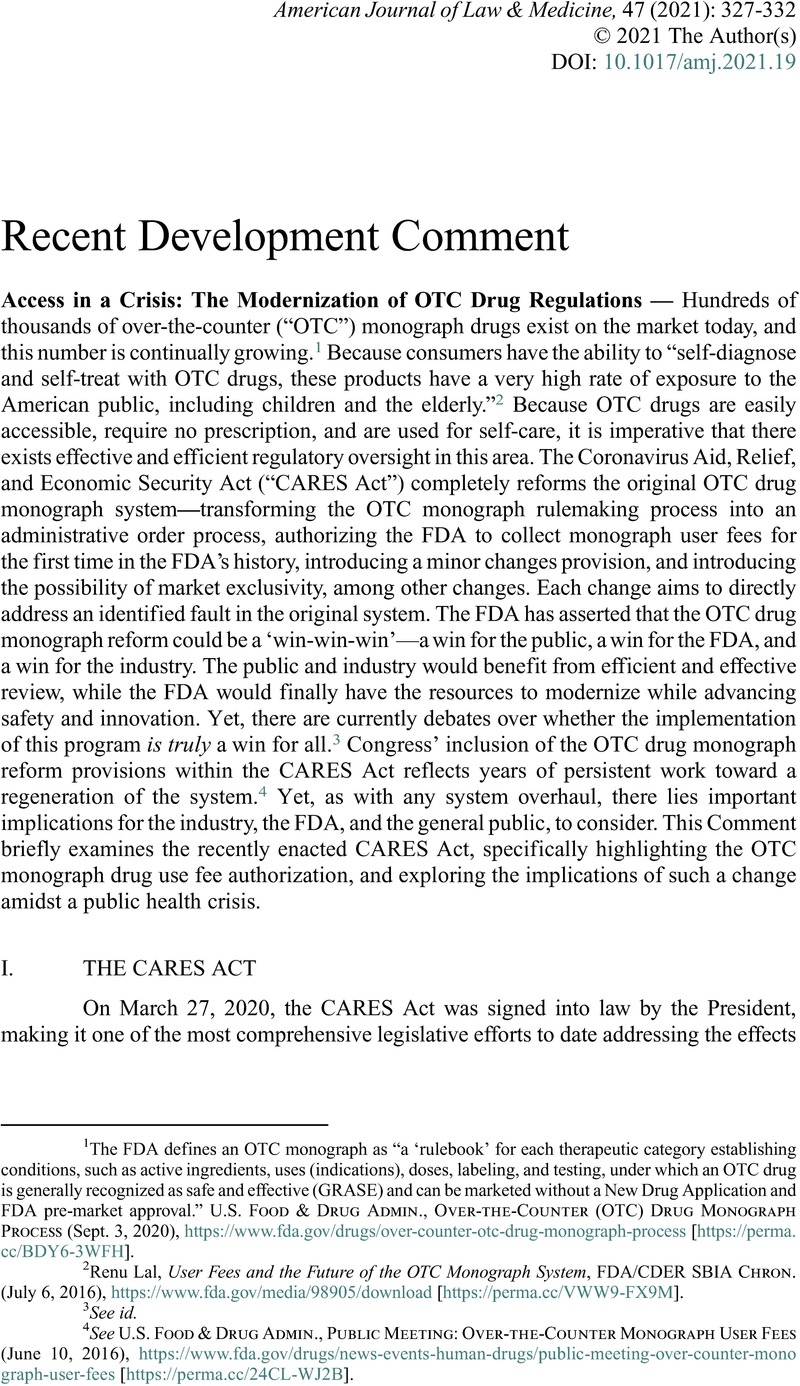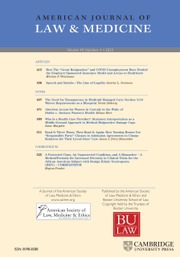No CrossRef data available.
Article contents
Access in a Crisis: The Modernization of OTC Drug Regulations
Published online by Cambridge University Press: 18 August 2021
Abstract

- Type
- Recent development comments
- Information
- Copyright
- © 2021 The Author(s)
References
1 The FDA defines an OTC monograph as “a ‘rulebook’ for each therapeutic category establishing conditions, such as active ingredients, uses (indications), doses, labeling, and testing, under which an OTC drug is generally recognized as safe and effective (GRASE) and can be marketed without a New Drug Application and FDA pre-market approval.” U.S. Food & Drug Admin., Over-the-Counter (OTC) Drug Monograph Process (Sept. 3, 2020), https://www.fda.gov/drugs/over-counter-otc-drug-monograph-process [https://perma.cc/BDY6-3WFH].
2 Renu Lal, User Fees and the Future of the OTC Monograph System, FDA/CDER SBIA Chron. (July 6, 2016), https://www.fda.gov/media/98905/download [https://perma.cc/VWW9-FX9M].
3 See id.
4 See U.S. Food & Drug Admin., Public Meeting: Over-the-Counter Monograph User Fees (June 10, 2016), https://www.fda.gov/drugs/news-events-human-drugs/public-meeting-over-counter-monograph-user-fees [https://perma.cc/24CL-WJ2B].
5 Coronavirus Aid, Relief, and Economic Protection (CARES) Act, H.R. 748, 116th Congress (2020), https://www.congress.gov/116/bills/hr748/BILLS-116hr748eas.pdf [https://perma.cc/A4UM-VCFK].
6 The Coronavirus Preparedness and Response Supplemental Appropriations Act, H.R. 6040, Pub. L. No: 116-123 (2019-2020).
7 The Families First Coronavirus Response Act, H.R. 6201, Pub. L. No: 116-123 (2019-2020); Shelia Burke et. al., Coronavirus: Key Aspects of $8.3 Billion Spending Package – Overview of Coronavirus Preparedness Response Supplemental Appropriations Act, Baker Donelson (Mar. 12, 2020), https://www.jdsupra.com/legalnews/coronavirus-key-aspects-of-8-3-billion-81697/ [https://perma.cc/4SEY-VRER].
8 See Kellie Moss et. al., The Coronavirus Aid, Relief, and Economic Security Act: Summary of Key Health Provisions, KFF (Apr. 9, 2020), https://www.kff.org/coronavirus-covid-19/issue-brief/the-coronavirus-aid-relief-and-economic-security-act-summary-of-key-health-provisions [https://perma.cc/3JBS-YLU4].
9 Michael Mezher, Senate Passes OTC Monograph Reform Bill, Reg. Focus (Dec. 11, 2019), https://www.raps.org/news-and-articles/news-articles/2019/12/senate-passes-otc-drug-monograph-reform-bill [https://web.archive.org/web/20210603134359/https://www.raps.org/news-and-articles/news-articles/2019/12/senate-passes-otc-drug-monograph-reform-bill].
10 U.S. Food & Drug Admin, Drug Applications for Over-the-Counter (OTC) Drugs. (Mar. 31, 2020), https://www.fda.gov/drugs/types-applications/drug-applications-over-counter-otc-drugs [https://perma.cc/38X7-LYAQ].
11 Modernizing FDA’s Regulation of Over-the Counter Drugs, Before the H. Energy and Commerce Committee, Subcomm. on Health (Sept. 13, 2017) (testimony of Janet Woodcock, M.D., Director, Center for Drug Evaluation and Research), https://www.fda.gov/news-events/congressional-testimony/modernizing-fdas-regulation-over-counter-drugs [https://perma.cc/FC3V-LY2D].
12 Lars Noah, Reversal of Fortune: Moving Pharmaceuticals from over-the-Counter to Prescription Status?, 63 Vill. L. Rev. 355, 367 (2018).
13 See Theresa M. Michele, M.D., Dir., Monograph Reform is Here!, PowerPoint Presentation at the Office of Nonprescription, Food and Drug Admin. (May 29, 2020), https://www.fda.gov/media/139503/download [https://perma.cc/L349-S2V3].
14 See Modernizing FDA’s Regulation of Over-the-Counter Drugs, Hearing Before the Subcomm. on Health, 117th Congress, First Session (Sept. 13, 2017).
15 See Woodcock, supra note 11.
16 See id.
17 Joan Baughan et. al., FDA’s OTC Drug Review Process Modernized by the CARES Act, Steptoe (Apr. 6, 2020), https://www.steptoe.com/en/news-publications/fdas-otc-drug-review-process-modernized-by-the-cares-act.html [https://perma.cc/8GCL-KFDV] (“For 2021, the facility fee will be due on the later of the first business day of July 2020, or 45 calendar days after publication of a Federal Register notice publishing the fees. Thereafter, the facility fee will be due on the later of the first business day of June, or the first business day after the enactment of an appropriations act providing for the collection and obligation of user fees.”).
18 COVID-19 Stimulus Legislation Will Cost OTC Manufacturers, Carmargo (Apr. 2, 2020), https://camargopharma.com/resources/blog/covid-19-stimulus-legislation-will-cost-otc-manufacturers/ [https://perma.cc/KH6P-RNEU] (“Sites which manufacture OTC products are required to self-identify via the electronic Drug Registration and Listing System (eDRLS).”).
19 David C. Spangler and Rachel Rathore, OTC Monograph Reform Legislation is Now Law一What Does It Do?, Food and Drug Law Inst. (Summer 2020), https://www.fdli.org/2020/05/otc-monograph-reform-legislation-is-now-law-what-does-it-do/ [https://perma.cc/TXR3-ZBT4].
20 There exist two types of OMORs: Tier 1 and Tier 2. Tier 1 OMORs are requests for generally more significant changes to an OTC monograph. A Tier 1 OMOR is defined as “any request not determined to be a Tier 2 OMOR.” A few examples of a Tier 1 OMOR include: (1) any addition of a new ingredient to an existing monograph that already contains one or more GRASE ingredients; (2) any addition of a new indication to an existing monograph with one or more GRASE ingredients; and (3) any additional new therapeutic category] Tier 2 OMORs fall under a specific list of changes, specified in the FDA’s goals and user fee documents. Tier 2 OMORs are generally less significant, as examples include: (1) a request to reorder “existing information in the Drug Facts Label (DFL)”; (2) a request to add information in the “other information section of the DFL”; (3) a request to modify the “Directions for Use section of the DFL”; and (4) a request to add an “interchangeable term,” among other things. See Theresa M. Michele, supra note 13.
21 David C. Spangler, supra note 19.
22 The Prescription Drug User Fee Act (PDUFA) was first enacted in 1992 and “authorizes FDA to collect fees from companies that manufacture certain human drugs and biological products in exchange for FDA improving the review process for new drug applications (NDAs) and biologics license applications (BLAs)”; The Generic Drug User Fee Act (GDUFA) was originally enacted in 2012 “to improve access to generic drugs” and provided the FDA with “resources to expedite the review of abbreviated new drug applications (ANDAs), including significant resources to eliminate a substantial backlog of ANDAs that had built up over several years and were awaiting a final FDA decision of approvability”; Like GDUFA, the Biosimilar User Fee Act (BsUFA) was first enacted in 2012 “to enable FDA to collect fees from biosimilar companies to aid in the assessment of development programs and applications for marketing approval”; The medical device user fee program, known as MDUFA, was enacted in 2002 and provides resources to the FDA to effectively and efficiently review medical devices. Aaron L. Josephson, FDA User Fees: Highlights from FDARA & Our Forecast for the Next Round, Mintz (Feb. 3, 2020), https://www.mintz.com/insights-center/viewpoints/2146/2020-02-fda-user-fees-highlights-fdara-our-forecast-next-round [https://perma.cc/J7H8-SFAM].
23 Lal, supra note 2.
24 Id.
25 Stakeholders primarily include “consumer and healthcare professional organizations, industry associations, and members of the scientific community.” Id.
26 See CARES Act, supra note 5. The exception for certain safety changes states, “A person who is named as the requestor in an OTC monograph order shall not be subject to a fee under subparagraph (A) if the Secretary finds that the OTC monograph order request seeks to change the drug facts labeling of an OTC monograph drug in a way that would add to or strengthen — “(i) a contraindication, warning, or precaution; “(ii) a statement about risk associated with misuse or abuse; or “(iii) an instruction about dosage and administration that is intended to increase the safe use of the OTC monograph drug.” Id.
27 Id. (An “arrears list” is a publicly posted list of “companies have not satisfied the annual program fee as required under the [Act].”).
28 See Woodcock, supra note 11.
29 Benjamin M. Zegarelli et. al., OTC Monograph Reform: Key Takeaways and What Industry Can Expect, Mintz (June 10, 2020), https://www.mintz.com/insights-center/viewpoints/2791/2020-06-10-otc-monograph-reform-key-takeaways-and-what-industry-can [https://perma.cc/39GZ-VS9M].
30 Id.
31 Id.
32 FDA faces coronavirus vaccine approval while mired in political controversy, Deutsche Welle (Dec. 9, 2020), https://www.dw.com/en/fda-faces-coronavirus-vaccine-approval-while-mired-in-political-controversy/a-55737801 [https://perma.cc/7D58-EBXM].
33 Press Release, U.S. Food & Drug Admin., FDA on Signing of the COVID-19 Emergency Relief Bill, Including Landmark Over-the-Counter Drug Reform and User Fee Legislation (Mar. 30, 2020), https://www.fda.gov/news-events/press-announcements/fda-signing-covid-19-emergency-relief-bill-including-landmark-over-counter-drug-reform-and-user-fee [https://perma.cc/M7DD-GH6J].
34 Christine Kirk and Carter Cornick, Over-the-Counter Drug Monograph Reform Legislation in the 116th Congress, Food and Drug Law Inst. (2020), https://www.fdli.org/2019/05/over-the-counter-drug-monograph-reform-legislation-in-the-116th-congress/ [https://perma.cc/8HB6-X47W].
35 Id.
36 See Stephen M. Hahn, supra note 33.




